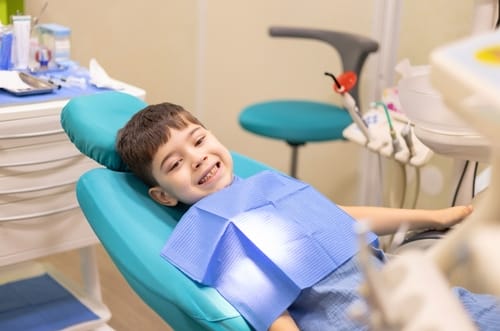
15
Oct
Children’s Preventative Dentistry: Building a Healthy Smile from the Start

Preventative dentistry is all about taking action to keep your child’s smile safe before any problems start. When you set up a strong base of preventative care, you can lower the risk of cavities, gum disease, and other dental issues. This approach not only protects your child’s oral health but also helps them build good habits for their teeth, which will serve them well for the rest of their lives.
The Importance of Early Dental Visits
It’s a common misconception that kids only need to see a dentist when they have many teeth. The American Academy of Pediatric Dentistry recommends the first dental visit by age one or within six months after the first tooth emerges.
Early dental visits establish a safe environment for dental care and ensure proper primary tooth care. During these initial visits, the dental team assesses oral health, checks for decay, and educates on age-appropriate hygiene practices.
Starting dental visits early can reduce dental anxiety and promote lifelong oral health by addressing issues promptly.
How Preventative Dentistry Sets the Foundation for Lifelong Oral Health
Good oral health is crucial for a child’s overall well-being, not just healthy teeth. Tooth decay can cause pain, eating difficulties, and even speech development issues if untreated. Preventative dentistry aims to establish healthy habits and prevent problems. Regular cleanings remove plaque and tartar, fluoride treatments strengthen enamel against decay, and sealants protect teeth from bacteria. These measures, combined with proper home care, lay the foundation for lifelong oral health. Early action by parents is key to maintaining good oral health into adulthood.
Common Preventative Treatments
Dentists use many ways to keep your child’s teeth healthy. These treatments help stop common problems, like tooth decay and gum disease before they need serious work.
They offer regular cleanings, fluoride treatments, and dental sealants. These steps are essential to protect young teeth and gums. When combined with good hygiene at home, they help keep your child’s smile bright and healthy.
The Role of Fluoride Treatments in Strengthening Young Teeth
Fluoride is crucial for strong teeth, protecting enamel against decay. It’s especially beneficial for children with developing enamel. Dentists apply stronger fluoride treatments during check-ups to strengthen enamel and prevent cavities. Regular use of fluoride treatments and toothpaste can reduce cavity risk in children, enhancing their dental defense.
Dental Sealants: A Shield Against Cavities
Dental sealants are a strong barrier against cavities, particularly on back teeth where chewing occurs. The sealant, a thin coating, is applied to the chewing surfaces, creating a shield over deep grooves and cracks. This prevents food particles and bacteria from causing decay. Sealants effectively prevent cavities in children and teenagers without discomfort, lasting years to protect back teeth.
Nutritional Counseling for Healthy Teeth
A balanced diet is crucial for a child’s health. It helps keep their teeth strong and healthy, too. What your child eats can affect their oral health. It can change how strong their enamel is and how likely they are to get cavities.
Dentists offer nutrition advice to help parents choose healthy foods. This advice teaches parents which foods are good for teeth and explains which foods to limit to lower the chances of dental problems.
Identifying Foods That Benefit Oral Health
A healthy smile starts with a balanced diet rich in nutrients. Crunchy fruits and vegetables act as natural toothbrushes, while dairy products provide calcium for strong teeth. Water helps wash away food particles for a healthy smile and strong teeth.
Foods and Habits to Avoid for Preventing Dental Issues
Just as certain foods benefit oral health, some foods and habits can harm your child’s teeth. Limiting sugary foods and drinks is crucial in preventing cavities. Sugar feeds the bacteria in plaque, producing acids that attack tooth enamel and lead to cavities.
Sticky candies and sugary drinks are particularly harmful, as they cling to teeth and prolong sugar exposure. Frequent snacking, even on healthy foods, can also increase the risk of cavities by creating a constant acid attack on teeth.
Here’s a quick guide to foods to consume in moderation:
| Food/Drink Category | Examples |
| Sugary Drinks | Soda, fruit juice, sports drinks |
| Sticky Candies | Gummy bears, caramel, toffee |
| Starchy Foods | Chips, crackers, white bread |
Encourage your child to drink water or milk instead of sugary beverages and choose healthy snacks like fruits, vegetables, or cheese. By reducing sugar intake and promoting healthy eating habits, you significantly reduce the risk of cavities and other dental issues that may require extensive dental treatment later on.
Oral Hygiene Practices for Kids
Establishing a regular oral hygiene routine is very important for your child’s oral health. Begin teaching them good habits as soon as you can. Make it fun and a usual part of their daily life.
Brushing and flossing, along with regular dental check-ups, are key to avoiding cavities, gum disease, and other oral health issues. By teaching these good habits early, you help create a lifetime of healthy smiles.
Teaching Your Child Effective Brushing Techniques
Brushing twice daily with fluoride toothpaste is crucial for good oral hygiene. Use a soft-bristled toothbrush that fits comfortably in your child’s mouth, ensuring they reach all areas easily. Supervise them to ensure proper technique, gently brushing in circular motions for two minutes each time. Make brushing fun by incorporating it into their routine, singing songs, or letting them choose a fun toothbrush and tasty toothpaste flavor.
The Significance of Flossing from an Early Age
Brushing cleans teeth surfaces, but flossing is crucial for removing plaque and food particles stuck between teeth. Start flossing your child’s teeth early to maintain healthy gums and prevent gum disease. Kids may need assistance until around ages 8 or 9. Use a floss pick or dental floss, gently moving it up and down between each tooth while curving around the base for effective plaque removal. Regular flossing, alongside brushing, is essential in preventing gum disease, which can lead to inflammation, bleeding, and tooth loss if left untreated. Incorporate flossing into your child’s daily oral hygiene routine for optimal oral health.
Schedule an Appointment Today
Goochland Dentistry is here to protect your child’s smile. Whether they’re a little one in need of their first dental appointment or a teenager working to maintain good oral health through adolescence, the services can provide the results they, and you, are looking for. Schedule their appointment online or by phone.







